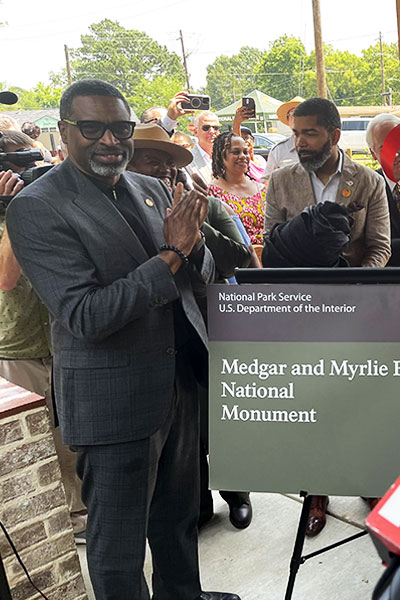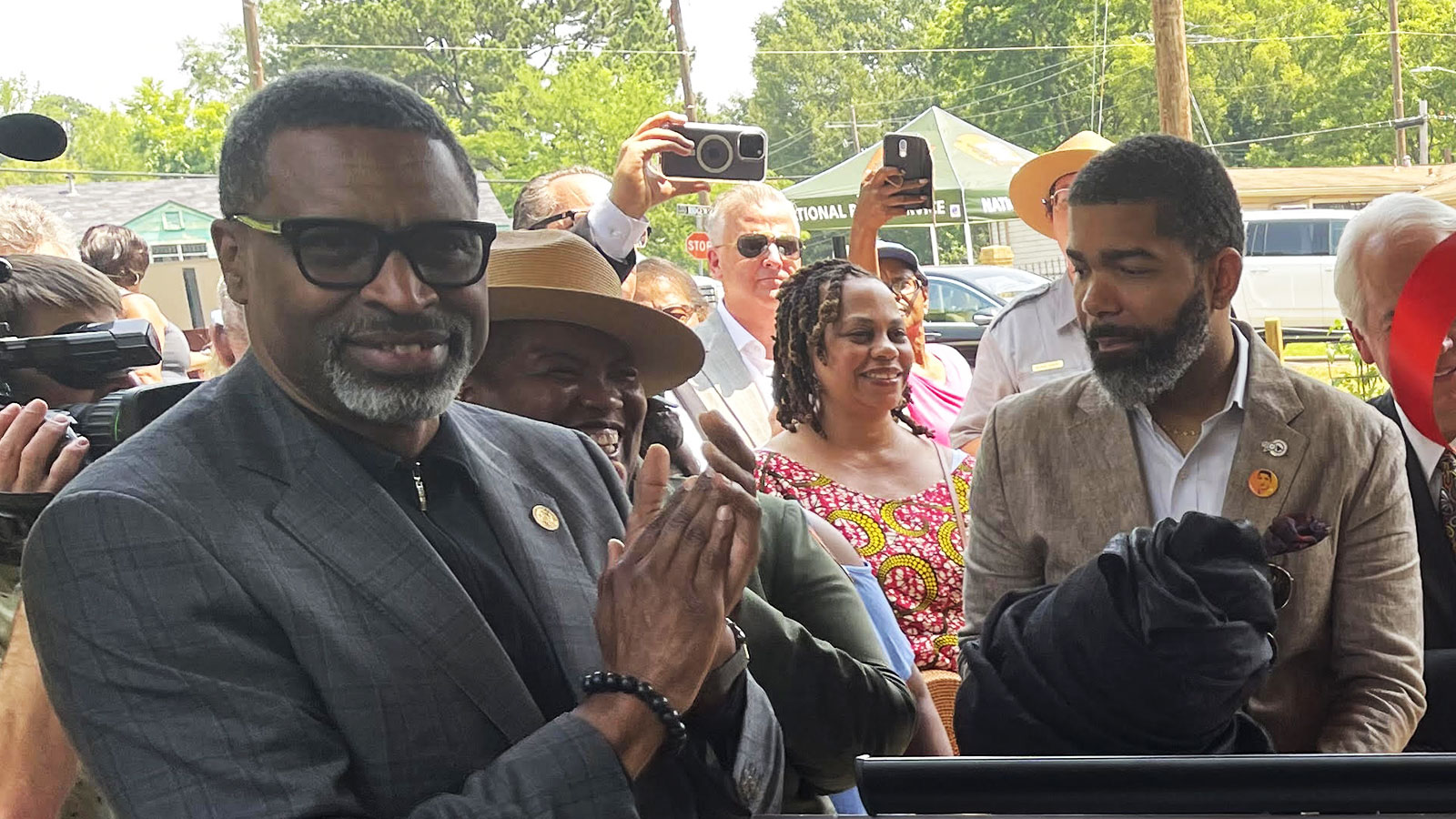There were a number of memorable moments in the nearly weeklong commemoration of the 60th anniversary of the assassination of Medgar Wiley Evers, including the home of Medgar and Myrlie being enshrined as a national monument. During the Medgar and Myrlie Evers Institute of Courage and Justice Gala from June 7–12 in Jackson, Mississippi, the Rev. Al Sharpton put it all in perspective in his address to the crowded ballroom. “Our struggle is about continuity,” he said. “It’s about celebration, commemoration, and continuity. For every step we take forward, there’s a step back, and that’s why we got to keep moving.”
Moving forward is something that Evers emphasized on each and every occasion during the festivities. At the very beginning of the celebration, she reflected on the past, recalling those harrowing moments after her husband’s assassination. “Standing next to me is one of my strongest supporters: our daughter Reena Evers-Everette,” she said at the podium. “It must have been a day after her father was killed and Reena came in, put her arms around me, and she said ‘Mom don’t cry, I will take care of you.’ I have never forgotten that. Thank you, Reena.”

Myrlie Evers holds aloft the ribbon after cutting it to launch their home as a national monument. At her left is her daughter Reena. Mayor Chokwe Antar Lumumba is at the back of the sign. Credit: Herb Boyd photo
Evers asked, “How much time do I have to speak?” to loud laughter from the crowd. “No, I’ll make it brief.” She noted that “this is a very emotional time…because Medgar is still very much a part of me and he’s still here. Emotional because of the personal struggle our family has had over the years.” She went on to recall that she thought her life was over when her husband was shot. “But now, I realize it was just beginning,” she continued. “There were three children looking up to me and others.”
Toward the close of her speech, she recounted the conversations she had with Medgar about how he could love Mississippi so deeply, and he would explain to her that he was born there just as she was born in Vicksburg. “I stand before you today and I know I am aging, and I don’t know if I’m aging with grace, but I know I am strong.”
On several occasions, she recalled her partnership with Medgar, his love for children, and how devoted he was to their family. She thanked all those who turned out for the event “because Medgar is still very much with us.”
To some extent, Medgar’s presence was felt in the music provided by the band from the New Orleans National Historical Park, particularly when they summoned the Staple Singers with their version of “I’ll Take You There.”
Mayor Chokwe Antar Lumumba, among a coterie of dignitaries at the event, said the city is planning to remove the statue of Andrew Jackson. “Condoleezza Rice was right: We can’t change history, but we can change who we choose to honor,” he said to loud applause.
Diane Regas, president and CEO of the Trust for Public Land, explained her organization’s key role in making the Medgar and Myrlie Evers Home National Monument possible, and said similar moves are being made in many places across the country. Billy Thornton, vice president of the Mississippi Power Company; Haley Fisackerly, president and CEO of Entergy; Ruth Hernandez Prescott, National Park Foundation chief of staff; and Keena Graham, National Park Service superintendent, were other speakers whose organizations and institutions were vital to the success of the dedication.
Equally festive was a brunch at the Sheraton near Jackson’s Medgar Evers International Airport, where a choir from the Voices of Courage and Justice concert resonated gloriously, especially when their lead singer rocked the place with his rendition of “Stand.” It was a louder version of the “stand” that Myrlie expressed in her presentation.
Bishop William Barber, as he has done so eloquently in his Moral Mondays travels, gave the moment a special reverence by placing the Evers family in the powerful matrix of the struggle for human and civil rights.
To capture the full impact of the gala requires a separate article and the lineup alone would exhaust most accounts, most notably Sharpton, the Rev. Mark Thompson, Lumumba, and countless others who appeared in videos, including Smokey Robinson; former U.S Attorney Eric Holder, who said, “We must be warriors for justice like Medgar and Myrlie”; former President Bill Clinton; and Lonnie Bunch, secretary of the Smithsonian Institution. It was wonderful to see Rep. Bennie Thompson and James Meredith dressed so splendidly for the occasion. The interludes from Bi Biz Band gave the evening a jazzy bounce as a few attendees eagerly awaited Kenny Lattimore.
A parade and march of silence were other scheduled events to mark what Sharpton cited as several days of celebration, commemoration, and the continuity of struggle. Some of the spirit of the event was captured during a panel at Millsaps College, where yours truly shared the stage with Jerry Mitchell, author Diane McWhorter, and WLBT anchor Howard Ballou on the role of the press in the struggle for freedom and justice. As usual, Myrlie was right down front. As she listened intently to the panelists, there was a quiet strength that also prevailed later at the gala when she recounted her determination to prove to the world that despite the color of her skin, she was going to excel.
Joining her in the audience were filmmakers Keith Beauchamp and Loki Mulholland, who with civil rights activist Joan Trumpauer Mulholland were ubiquitous, attending nearly every event. Accompanying Beauchamp, who is still on the theater circuit promoting the film “Till,” were Debrorah Watts and her daughter Terri of the Emmett Louis Till Legacy Foundation; and attorney Jaribu Hill. Dr. Brenda Greene, a professor at Medgar Evers College in Brooklyn, enjoyed the various events, along with Professor Richard Jones, executive director of the College.
There were numerous honorees in addition to Bunch, Holder, Meredith, and Thompson. Other distinguished recipients were Gloria Steinem, writer and activist; Mildred Bond Roxborough, a veteran stalwart at the NAACP; LaJune Montgomery-Tabron, president and CEO of the W.K. Kellogg Foundation; William Bynum, CEO, Hope Credit Union; Marian Wright Edelman, founder and president emerita, Children’s Defense Fund; Dr. Hazel Dukes, president and CEO, NAACP New York State Conference; Secretary Deb Haaland, U.S. Secretary of the Interior; Ray Mabus, former Secretary of the U.S. Navy; and Andrew Young, former U.S. Ambassador to the UN.
At 90, Myrlie has lost none of the zeal and commitment, none of that dedication and determination to complete her mission and fulfill her promise to Medgar and her children to ensure the legacy of their name and love for the people.















